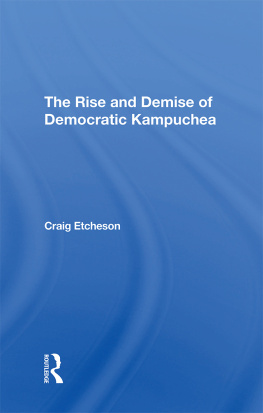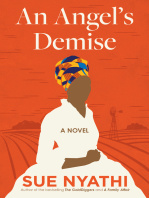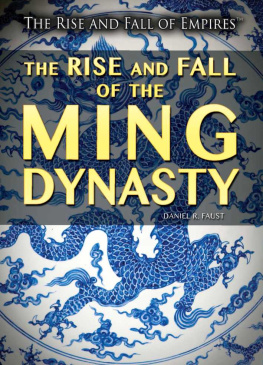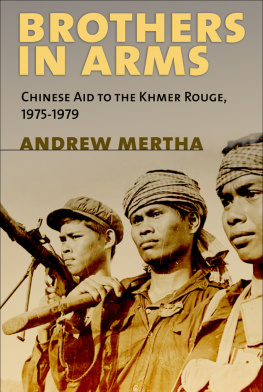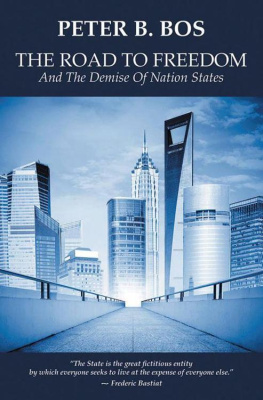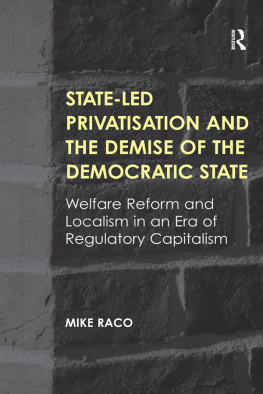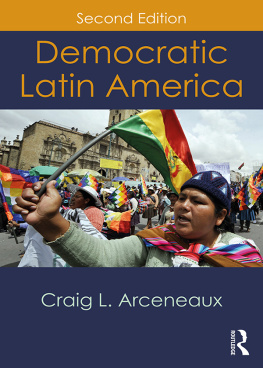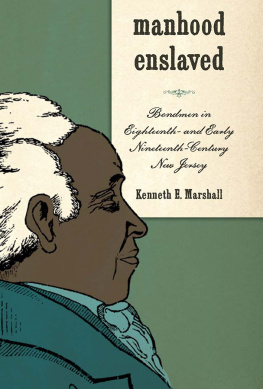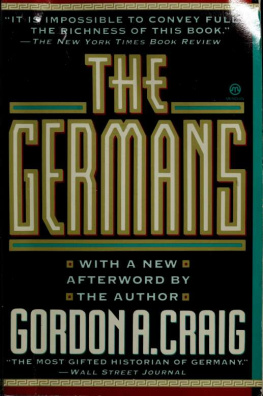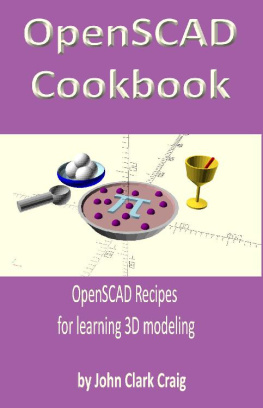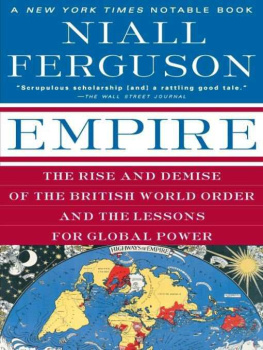The Rise and Demise of Democratic Kampuchea
About the Book and Author
The Rise and Demise of Democratic Kampuchea
Craig Etcheson
This study traces the rise of Kampuchean communism from its inception in 1930 to the present. The author analyzes the socioeconomic and political conditions that brought Cambodia to an explosive stage in 1970 and documents the cataclysmic transformation that followed. The protagonist in this ongoing historical drama is the revolutionary movement known as the Khmer Rouge, or "Red Khmers." Their revolution was so ultraradical that even the communists were appalled. The Soviets studiously ignored it, the Chinese vainly tried to moderate it, and the Vietnamese ultimately destroyed it. In an attempt to explain the Khmer revolutionone of the most violent in modern political historythe author focuses on the ideology created by a key group of Khmer Rouge leaders.
The theoretical and historical significance of the Khmer revolution and the state of Democratic Kampuchea has received little attention from scholars, and far too much of what has been written has been motivated by a bewildering array of ideological and geopolitical interests. This book is one of the first to apply a systematic analytical framework to the creation, growth, and destruction of Democratic Kampuchea.
Craig Etcheson is a research associate with the Institute for Transnational Studies at the University of Southern California, where he teaches in the School of International Relations.
The Rise and Demise of Democratic Kampuchea
Craig Etcheson
First published 1984 by Westview Press, Inc.
Published 2019 by Routledge
52 Vanderbilt Avenue, New York, NY 10017
2 Park Square, Milton Park, Abingdon, Oxon OX14 4RN
Routledge is an imprint of the Taylor & Francis Group, an informa business
Copyright 1984 Taylor & Francis
All rights reserved. No part of this book may be reprinted or reproduced or utilised in any form or by any electronic, mechanical, or other means, now known or hereafter invented, including photocopying and recording, or in any information storage or retrieval system, without permission in writing from the publishers.
Notice:
Product or corporate names may be trademarks or registered trademarks, and are used only for identification and explanation without intent to infringe.
ISBN 13: 978-0-367-29554-7 (hbk)
For Mary
"What then?" I said. "Do you agree that the things we have said about the city and the regime are not in every way prayers; that they are hard but in a way possible; and that it is possible in no other way than the one stated: when the true philosophers, either one or more, come to power in a city, they will despise the current honors and believe them to be illiberal and worth nothing. Putting what is right and the honors coming from it above all, while taking what is just as the greatest and the most necessary, and serving and fostering it, they will provide for their own city."
"How?" he said.
"All those in the city who happen to be older than ten they will send out to the country; and taking over their children, they will rear them far away from those dispositions they have now from their parents in their own manners and laws that are such as we described before. And, with the city and the regime of which we were speaking thus established most quickly and easily, it will itself be happy and most profit the nation in which it comes to be."
"That is by far the quickest and easiest way," he said. "And how it would come into being, if it ever were to come into being, you have, in my opinion, Socrates, well stated."
Plato, Republic (540c-541b)
From this mlange of North Vietnamese determination, Cambodian rivalries, and American internal conflicts, everything followed with the inevitability of a Greek tragedy until there descended on that gentle land a horror that it did not deserve and that none of us have the right to forget.
Henry A. Kissinger (1979)
- Tables
- Figures
- Maps
- Photographs
The sole great truth in politics is that there is no objective Truth in politics. Politics is a world of compromise and doublecross, of alliance and comparative political advantage, of redeemed villainy and corrupted ideals, of victory and sudden death. More is at stake than the survival of particular forms of political institutions.
On the surface, this is a tale of war arid death. As many as three million or more human beings perished as a result of the events examined in this study. Frankly, this story is still somewhat beyond my comprehension, too fantastically macabre to understand fully even after long study. Yet, it is important to try to do so, for beneath the glossy, somehow unreal surface sheen of megadeath, there lies another story. Indeed, it is the story of a search for Utopia, and the discovery of something quite different.
This study originated as a paper for a seminar on guerrilla movements in the Third World, under the direction of Gerald Bender at the University of Southern California's School of International Relations in the spring of 1980. My thanks for their comments go to members of the seminar, including Neil Scarth, Kevin McDonnough, Al Zapanta, Leslie Gunn, Ary Aryania, Jason Chao, Shobana Kokatay, Menelek Sessing, Mohamed Diakite, Bernard Wilhelm, Mohammed Mariri, Fesseha Wolde-Emanuel, Sadiq Mehros, Sarah Fishman, and Gorden Townsend.
The bulk of the research and writing for this study was done during the summer of 1981, while the author was employed as a research associate at the University of Southern California's Institute for Transnational Studies, A debt of gratitude is owed to the institute's director, James N, Rosenau, for arranging work schedules flexible enough to permit this "extracurricular" activity, and to the institute's administrative coordinators, Liz Nelson and Carole Gustin, for generous secretarial assistance and unflagging cheerfulness in the face of a summer's worth of exhaustion-induced impatience.
("The 'Precious Model': Implications of the Classless Society") very much reflects Neil's research on comparative models of economic development.
The study was completed in the spring of 1983, and I had a lot of help. Thanks are in order to the School of International Relations at the University of Southern California and to its director, Dr. Michael Fry, for a grant from the Von Kleinsmid Endowment to assist in the final preparation of the manuscript, and to the School of International Relations Machine Laboratory for computing resources used to process the final draft and produce the tables. Michelle Raymond assisted in the preparation of the tables using the Scribe Document Preparation System and a Xerox 2700 Laser Graphics Printer. were produced by Engineering Associates, Inc., of Los Angeles.
I would also like to acknowledge helpful comments, criticisms, and contributions by Michelle Raymond, Dan Garst, Jung Il-Hwa, Peter Berton, Stanley Rosen, Jonathan Aronson, James Rosenau, Kanthati Suphamongkhon, Constance Lynch, Gerard Chaliand, Heidi Hobbs, Douglas Pike, William Shawcross, Laura Summers, Walter Aschmoneit, Ben Kiernan, and Chanthou Boua. Special thanks go to Lynn Sipes and Janice Hanks of USC's Von Kleinsmid Library for research assistance above and beyond the call of duty. Thanks also to the editors and anonymous reviewers at Westview Press for helpful input.


